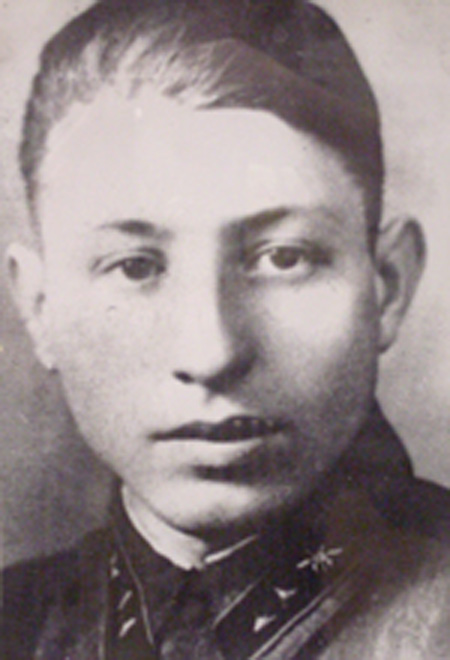Ruvim Sprintson was born in 1918 in Vitebsk. After graduating school, he worked as a photographer at a photo studio in his city. In October 1938, he was drafted into the Red Army. By the time of the German attack on the Soviet Union in June 1941, he was an experienced radio-operator with the rank of senior sergeant. He served on the Leningrad Front as the commander of a radio station with a separate communication battalion of his division.
In August 1942, Sprintson's regiment fought at the Ivanovskoe bridgehead, east of Leningrad. One day Ruvim Sprintson and three other soldiers were sent close to the village of Ivanovskoe, with the order to establish a reconnaissance and radio position near the enemy's front line. Sprintson's group was detected by the Germans. After a short skirmish with the enemy, the group succeeded in taking shelter in a ruined stone house, which had a solid basement. From there Sprintson's radio station began to send information about the enemy, but was surrounded by the Germans, who had three tanks. It is likely that the Germans wanted to capture them alive. Sprintson sent off to another Red Army unit the following request that included the coordinates of the house: "Shell the stone house. The fascists are surrounding us." The Soviet asked the radio operator and his group to help them aim adjust as precisely as possible and then began to shell the tanks and the German infantry men who were attempting to capture Sprintson's group. The fighting between the radio group supported by the Soviet artillery and the Germans continued for four days. During all this time Sprintson's men, who had nothing to eat and not a moment to rest, continued broadcasting reconnaissance data to the HQ of their division. On the fifth day, the Soviets broke through the German encirclement and began taking the now totally deaf Sprintson and his wounded comrades from the house back to the Soviet positions.
When the group was already close to the Red Army trenches, Sprintson was killed by an enemy shell. He was recommended, posthumoursly, for the highest military award, the Order of Lenin, but was awarded a lower one, the Order of Red Banner. A postcard with Sprintson's likeness was issued by the postal authorities and an article on his heroic deed was prepared for publication.







